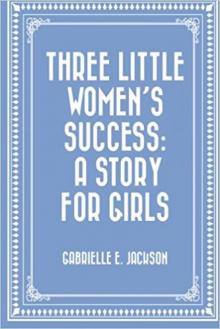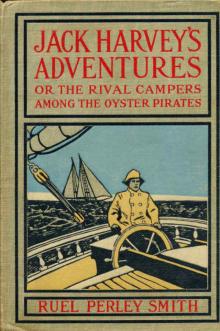- Home
- Gabrielle E. Jackson
Three Little Women: A Story for Girls Page 6
Three Little Women: A Story for Girls Read online
Page 6
CHAPTER VI
Blue Monday
October, with its wealth of color, its mellow days, and soft haze waspassing quickly and November was not far off: November with its"melancholy days" of "wailing winds and wintry woods."
Baltie had now been a member of the Carruth family for nearly a monthand had improved wonderfully under Mammy Melviny's care. How the oldwoman found time to care for him and the means to provide for him wasa source of wonder not only to Mrs. Carruth, but to the entireneighborhood who regarded the whole thing as a huge joke, and enjoyedmany a hearty laugh over it, for Mammy was considered a character bythe neighbors, and nobody felt much surprised at any new departure inwhich she might elect to indulge. Two or three friends had begged Mrs.Carruth to let them relieve her of the care of the old horse, assuringher that they would gladly keep him in their stables as long as heneeded a home, and ended in a hearty laugh at the thought of Mammyturning groom. But when Mrs. Carruth broached the subject to Mammy shewas met with flat opposition:
"Send dat ole horse off ter folks what was jist gwine tek keer of himfer cha'ity? _No_ I aint gwine do no sich t'ing. De Lawd sartin senthim ter me ter tek keer of an' I'se gwin ter _do_ it. Aint he mine?Didn't Jabe Raulsbury say dat anybody what would tek keer of him could_have_ him? Well I'se tekin' keer of him so _co'se_ he's _mine_. Iaint never is own no live stock befo' an now I _got_ some. Go 'long,Miss Jinny; you'se got plenty ter tend ter 'thout studyin' 'bout my_horse_. Bimeby like 'nough I have him so fed up and spry I can sellhim fer heap er cash--dough I don' believe anybody's got nigh 'noughfer ter buy him whilst Baby loves him."
And so the discussion ended and Baltie lived upon the fat of the landand was sheltered in Mrs. Carruth's unused stable. Dry leaves whichfell in red and yellow clouds from the maple, birch and oak trees madea far softer bed than the old horse had known in many a day. A bag ofbran was delivered at Mrs. Carruth's house for "Mammy Melviny," withHadyn Stuyvesant's compliments. Mammy herself, invested in a sack ofoats and a bale of cut hay, to say nothing of saving all bits of breadand parings from her kitchen, and Baltic waxed sleek and fat thereon.Jean was his devoted slave and daily led him about the grounds for aconstitutional. Up and down the driveway paced the little girl, theold horse plodding gently beside her, his ears pricked toward her forher faintest word, his head held in the pathetic, listening attitudeof a blind horse. He knew her step afar off, and his soft nicker neverfailed to welcome her as she drew near. To no one else did he showsuch little affectionate ways, or manifest such gentleness. He seemedto understand that to this little child, which one stroke of his greathoofs could have crushed, he owed his rescue and present comforts.
And so the weeks had slipped away. The money which Jean had left forMr. Pringle had been promptly refunded with a note to explain that theSociety had borne all the expenses for Baltie's board.
Mrs. Carruth sat in her library wrinkling her usually serene brow overa business letter this chilly Monday morning, and hurrying to get itcompleted before the arrival of the letter carrier who always took anyletters to be mailed. Her face wore a perplexed expression, and hereyes had tired lines about them, for the past year had been harder forher than anyone suspected. Her income, at best, was much too limitedto conduct her home as it had always been conducted, and the generalexpenses of living in Riveredge were steadily increasing. True, Mammywas frugality itself in the matter of providing, and Mrs. Carruthoften marveled at the small amounts of her weekly bills. But thedemands in other directions were heavy, and the expenses of the placeitself were large. More than once had she questioned the wisdom ofstriving to keep the home, believing that the tax upon her resources,and her anxiety, would be less if she gave it up and removed to townwhere she could live for far less than in Riveredge. Then arose thememory of the building of the home, the hopes, the plans, and the joysso inseparable from it, the children's well-being and their love forthe house their father had built; their education, and the environmentof a home in such a town as Riveredge.
Now, however, new difficulties were confronting her, for some of herinvestments were not making the returns she had expected and herincome was seriously affected. In spite of the utmost frugality andcare the outlook was not encouraging, and just now she had to meet thedemand of the fire insurance upon the home and its contents, and justhow to do so was the question which was causing her brows to wrinkle.She had let the matter stand until the last moment, but dared to do sono longer for upon that point Mr. Carruth had always been mostemphatic; the insurance upon his property must never lapse. He hadalways carried one, and since his death his wife had been careful tocontinue it. But _now_ how to meet the sum, and meet it at once, wasthe problem.
She had completed her letter when Mammy came to the door.
"Is yo' here, Miss Jinny? Is yo' busy? I wants to ax you sumpin'," shesaid as she gave a quick glance at Mrs. Carruth from her keen eyes.
"Come in, Mammy. What is it?"
The voice had a tired, anxious note in it which Mammy was quick tocatch.
"Wha' de matter, honey? Wha's plaguin' you dis mawnin'?" she asked asshe hurried across the room to rest her hand on her mistress'shoulder.
Like a weary child Mrs. Carruth let her head fall upon Mammy's bosom--aresting place that as long as she could remember had never failedher--as she said:
"Mammy, your baby is very weary, and sorely disheartened this morning,and very, very lonely."
The words ended in a sob.
Instantly all Mammy's sympathies were aroused. Gathering the wearyhead in her arms she stroked back the hair with her work-hardenedhand, as she said in the same tender tones she had used to soothe herbaby more than forty years ago:
"Dere, dere, honey, don' yo' fret; don' yo' fret. Tell Mammy jistwhat's pesterin' yo' an' she'll mak' it all right fer her baby. Hush!Hush. Mammy can tek keer of anythin'."
"Oh, Mammy dear, dear old Mammy, you take care of so much as it is.What _would_ we do without you?"
"Hush yo' talk chile! What I gwine do widout yo' all? Dat talk allfoolishness. Don't I b'long ter de fambly? Now yo' mind yo' Mammy an'tell her right off what's a frettin' yo' dis day. Yo' heah _me_?"
Mammy's voice was full of forty-five years of authority, but her eyeswere full of sympathetic tears, for her love for her "Miss Jinny" wasbeyond the expression of words.
"O Mammy, I am so foolish, and I fear so pitifully weak when it comesto conducting my business affairs wisely. You can't understand thesevexatious business matters which I must attend to, but I sorely missMr. Carruth when they arise and _must_ be met."
"Huccum I cyan't understand 'em? What Massa Bernard done tackle in hisbusiness dat I cyan't ef _yo'_ kin? Tell me dis minute just what you'gotter do, an' I bate yo' ten dollars I c'n _do_ it."
"I know there isn't anything you would not try to do, Mammy, fromtaking care of an old horse, to moving the contents of the entirehouse if it became necessary," replied Mrs. Carruth, smiling in spiteof herself, as she wiped her eyes, little realizing how near the truthwas her concluding remark regarding Mammy's prowess.
"I reckon I c'd move de hull house if I had _time_ enough, an' as ferde horse--huh! ain't he stanin' dere a livin' tes'imony of what abran-smash an' elbow-grease kin do? 'Pears lak his hairs rise right upan' call me bres-sed, dey's tekin' ter shinin' so sense I done rub myhans ober 'em," and Mammy, true to her racial characteristics, brokeinto a hearty laugh; so close together lies the capacity for joy orsorrow in this child race. The next instant, however, Mammy was allseriousness as she demanded:
"Now I want yo' ter tell me all 'bout dis bisness flummy-diddle what'sfrettin' yo'. Come now; out wid it, quick."
Was it the old habit of obedience to Mammy's dictates, or the woman'slonging for someone to confide in during these trying days ofloneliness, that impelled Mrs. Carruth to explain in as simplelanguage as possible the difficulties encompassing her?
The burden of meeting even the ordinary every-day expenses upon thevery limited income derived from Mr. Carruth's life insurance, whichleft no
margin whatsoever for emergencies. Of the imperative necessityof continuing the fire insurance he had always carried upon the homeand its contents, lest a few hours wipe out what it had required yearsto gather together, and his wife and children be left homeless. How,under their altered circumstances this seemed more than everimperative, since in the event of losing the house and its contentsthere would be no possible way of replacing either unless they keptthe insurance upon them paid up.
Mammy listened intently, now and again nodding her old head anduttering a Um-uh! Um-uh! of comprehension.
When Mrs. Carruth ceased speaking she asked:
"An' how much has yo' gotter plank right out dis minit fer ter keepdis hyer as'sur'nce f'om collaps'in', honey?"
"Nearly thirty dollars, Mammy, and that seems a very large sum to menow-a-days."
"Hum-uh! Yas'm. So it do. Um. An' yo' aint got it?"
"I have not got it to-day, Mammy. I shall have it next week, but thetime expires day after to-morrow and I do not know whether the companywill be willing to wait, or whether I should forfeit my claim by thedelay. I have written to ask."
"Huh! Wha' sort o' compiny is it dat wouldn't trus' a _Blairsdale_, Ilike ter know?" demanded Mammy indignantly.
Mrs. Carruth smiled sadly as she answered:
"These are not the old days, Mammy, and you know 'corporations have nosouls.'"
"No so'les? Huh, _I'se_ seen many a corpo'ration dat hatter have goodthick _leather_ soles fer ter tote 'em round. Well, well, times issho' 'nough changed an' dese hyer Norf ways don't set well on my bile;dey rises it, fer sure. So dey ain't gwine _trus'_ you, Baby? Wheredey live at who has de sesso 'bout it all?"
"The main office is in the city, Mammy, but they have, of course, alocal agent here."
"Wha' yo' mean by a locum agen', honey?"
"A clerk who has an office at 60 State street, and who attends to anybusiness the firm may have in Riveredge."
"Is yo' writ yo' letter ter him? Who _is_ he?"
"No, I have written to the New York office, because Mr. Carruth alwaystransacted his business there. I thought it wiser to, for this Mr.Sniffins is a very young man, and would probably not be prepared toanswer my question."
"Wha' yo' call him? Yo' don' mean dat little swimbly, red-headed,white-eyed sumpin' nu'er what sets down in dat basemen' office wid hisfoots cocked up on de rail-fence in front ob him, an' a segyar mos' asbig as his laig stuck in he's mouf all de time? I sees _him_ eve'ytime I goes ter market, an' he lak' ter mek me sick. Is _he_ deagen'?"
"Yes, Mammy, and I dare say he is capable enough, although I do notcare to come in contact with him if I can avoid it."
"If I ketches yo' in dat 'tater sprout's office I gwine smack yo'sure's yo' bo'n. Yo' heah _me_? Why _his_ ma keeps the _sody_-fountainon Main street. Wha-fo you gotter do wid such folks, Baby?"
"But, Mammy, they are worthy, respectable people,"--protested Mrs.Carruth.
"Hush yo' talk, chile. _I_ reckon I knows de diff'rence twixt qualityan' de _yether_ kind. Dat's no place fer yo' to go at," cried Mammy,all her instincts rebelling against the experiences her baby wasforced to meet in her altered circumstances. "Gimme dat letter. I'segwine straight off ter markit dis minit and I'll see dat it get sontoff ter de right pusson 'for I'se done anudder ting."
"But what did you wish to ask me, Mammy?"
"Nuffin'. 'Taint no 'count 'tall. I'll ax it when I comes back. Go'long up-stairs and mek yo' bed if yo pinin' for occerpation," andaway Mammy flounced from the room, leaving Mrs. Carruth more or lessbewildered. She would have been completely so could she have followedthe old woman.

 Three Little Women: A Story for Girls
Three Little Women: A Story for Girls Mated from the Morgue: A Tale of the Second Empire
Mated from the Morgue: A Tale of the Second Empire Three Little Women's Success: A Story for Girls
Three Little Women's Success: A Story for Girls Jack Harvey's Adventures; or, The Rival Campers Among the Oyster Pirates
Jack Harvey's Adventures; or, The Rival Campers Among the Oyster Pirates